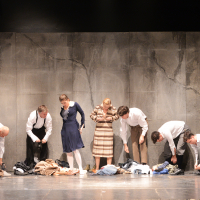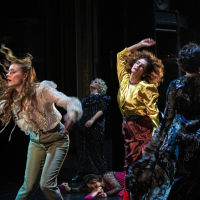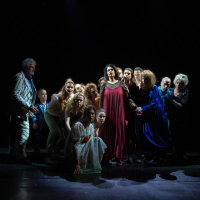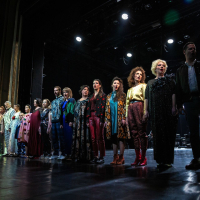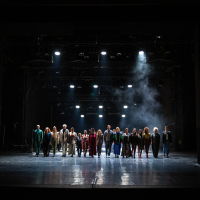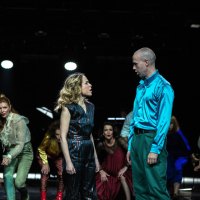Program
Back to archived listNational Theater Belgrade (Serbia)
Directed by: Irena Popović
CHILDREN / The text of the chamber opera was created as an adaptation of Milena Marković's novel of the same name. Composer: Irena Popović
Narodno pozorište Subotica - scena Jadran-
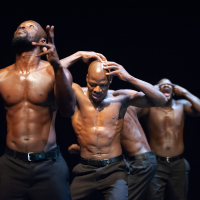 more details
more detailsOMMA
Pozorište 'Kosztolányi Dezső' -
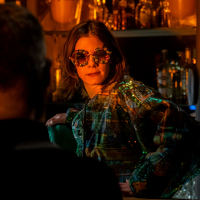 more details
more detailsMovement
Pozorište 'Kosztolányi Dezső' -
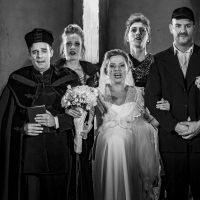 more details
more detailsPeasant opera / Pintér – Darvas
Narodno pozorište Subotica - scena Jadran -
more details
The use of man / Based on Aleksandar Tišma’s novel
Pozorište 'Kosztolányi Dezső' -
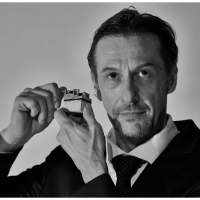 more details
more detailsThe night writer / Jan Fabre
Pozorište 'Kosztolányi Dezső'
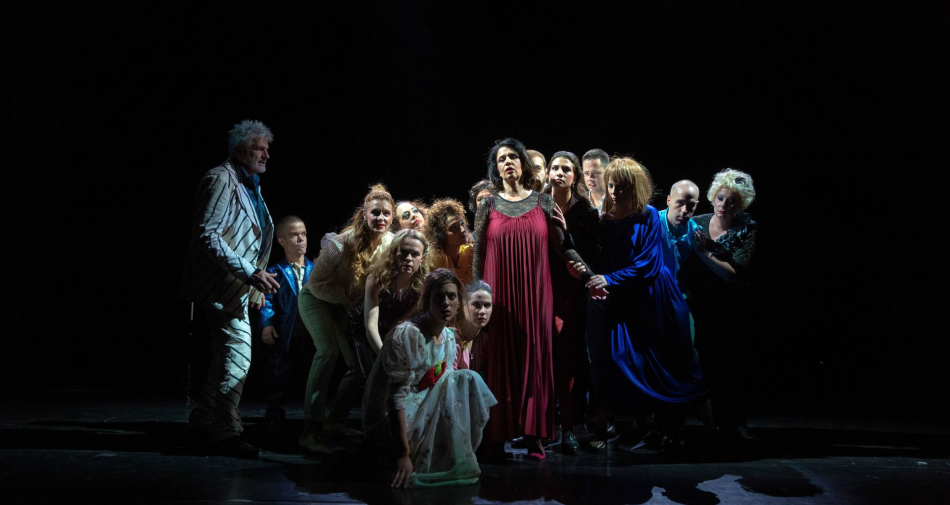
The original “restlessness” of the lyrics of "Children" may also be some compelling need to look at the reality reflected in them from at least another perspective, so why not the operatic one, which is often called “larger than life”.
Opera and realism are enemies. When a realistic situation is presented through singing, it passes into the realm of the surreal, often grotesque. Singing raises alertness because it magically changes the meaning of the text. Even the gravest situation, when you sing of it, balances on the verge of meaning, which can instantly turn from gravity to comedy, from comedy to melancholy, from melancholy to grotesque, etc.
The vocal sphere of "Children" is multiple, layered and at times elusive. The songs seem to be carried by the wind, they oscillate between the “ordinary” voices of actors, trained voices of singers, unexpected voices of orchestral musicians who also sometimes sing, naive voices of children, quasi-supporters’ voices of a male choir, church chanting of priests, turbo-folk poor singing like with a constricted throat, shrill women's folkloric singing. All these voices are refracted and mirrored through the opera "Children" as a reflection of the context (Belgrade, which subtly pervades through the novel or the former, today non-existent country of Yugoslavia), identity (Milena’s, children’s, Irena’s, woman’s, mother’s, man’s as the Other) and that voice ambivalence is what largely makes the entire work so powerful.
Jelena Novak, From Notes on Musicology
COMPOSER’S AND DIRECTOR’S NOTE (extract)
In the music I composed for "Children", I tried to find the tone of the collective voice, i.e. Milena's being. The complexity of Milena's poetry and its many layers allowed me to make this collective voice both operatic and ordinary, childlike and also perfect in its imperfect tone. The voices in "Children" are a unique combination of things that cannot be combined, and it seems to me that we get an overtone that floats through spaces and simply refuses to be defined and caught in the trap of classical analysis.
Milena's children are weak human children... spoiled, crying, angry, stumbling, trembling, jumping, delirious, dazed, conniving and they all want it all... Screaming human children...
Whenever we compose for children, we very often fall into the trap of adapting the music, which I really think is wrong. Through the verses that I quoted, Milena writes that the child is actually us who forgot, hid, wrapped that same child up in some false norms and codes of conduct. When I write i.e. when I compose about them, I become the same jumping and screaming child, liberated, happy... The very act of creation then becomes a play and a joy without any mystification and anxiety, and I just want that creative whirlwind to never end and last a hundred thousand million days and a hundred thousand million nights...
DRAMATURGE’S NOTE (extract)
The process of dramaturgical reading of "Children" was primarily based on the idea of reading the female voice of the author, originally placed in the domain of autofiction. The dramaturgical tools I used were abridgement and editing for the purpose of reorganising textual surfaces into new structures intended for stage performance.
The opera "Children" thus does not enter the domain of content presentation in the traditional way, but uses the written voice of the author as the basic position from which certain topics are discussed. Milena Marković's text as a recording of her author's voice (she consciously and deliberately shapes the text by speaking from the first person) is used as a trace of her voice, which is interpreted by different performers. In this way, the procedure of interpreting her voice written in the text of the novel-poem is developed, that voice gets fragmented and becomes complicated by increasing the number of those who interpret it and manipulate it through the process of taking over and presenting it on stage during the performance. The diversity of the performers is particularly emphasized in the performance itself, since the author's voice often becomes the voice taken over by the group, and only occasionally by a male individual, that is, a female individual who are never strictly defined by the continuous position they advocate, in order to avoid the trap of representing the author herself on stage. The transparency of the performers' age, sex and gender differences, then highlighting the diversity of the singing skills with which the performers convey that voice in this opera work, further complicates the performance itself.
CHOREOGRAPHER’S NOTE (extract)
In the circumstances of the stage space where music and text are strong factors, the key challenge and my "rebellious" need to resist that dominance as a choreographer, focused on how to design physical movement and the Body as an equal means of interpreting the above-mentioned motifs of the novel/libretto in constant dynamic dialogue with music. Numerous questions followed for the purpose of research, such as: what kind of affect does the operatic singing about a person descending from mountain people produce in the modernist form of the idyllic pastoral? How does a simple children's game from our childhood at the same time represent life's challenges of all of us? Can the cold repetitive sound of electronics touch us emotionally? How to make sublime operatic/musical catharsis grotesque, gentle, disturbing, attractive? Such a multi-layered research method together with actors and singers, resulted in the formation of a specific choreographic language and a composition of journeys through various physical landscapes, affects, dramatic relationships, voices, sound and words - which altogether embody the collective in the individual and the individual in the collective. Placed at the same time in the structure between other physical collectives on the stage - the chamber orchestra and the children's choir - as well as in front of the collective of the audience in the public space (theatre), the protagonists of this stage event create and embody a “ritual excess” that takes us through the time machine of the actuality of the shared past, present and future life, with a reminder that despite everything, we are still just children.
Played by
Nela Mihailović, Suzana Lukić, Predrag Miletic, Vanja Milacic, Pavle Jerinic, Milena Djordjevic, Bojana Stefanović, Bojana Bambic, Dragana Varagić, Aleksandar Vuckovic, Miona Marković, Teodora Sparavalo, Jelena Blagojević, Vladan Matović
Libretto by Dimitrije Kokanov
Musical dramaturgy by Jelena Novak
Dramaturgy of the play by Dimitrije Kokanov
Choreography by Igor Koruga
Costume design by Selena Orb
Scenography: Miraš Vuksanović
Stage speech by: Ljiljana Mrkić Popović
Professional associate of the director: Ana Grigorović
Accompanist: Ivan Mirković
Assistant composer/director: Nikola Dragović
Producers: Vuk Miletić, Miloš Golubović
Singers:
Tamara Mitrović, Iskra Sretović, Marko Kostić
Chamber Orchestra:
Nikola Dragović - concert master, violin, bass guitar
Ivan Mirković - piano
Aleksandar Jovan Krstić - flute, saxophone
Vladimir Gurbaj - clarinet
Luka Sparavalo - violin
Aleksandra Kijanović - viola
Pavle Rakočević - cello
Aleksandar Petrović - double bass
Vid Milošević - percussion
Tina Mladenović - small harp, piano, electronics
Children's choir "Hopes", the choir is led by Biljana Simenović
*Ticket price: 750 RSD (reduced price: 500 RSD)*
Photos: Marijana Janković
Duration: 01:30
